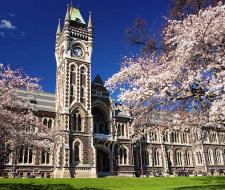Best universities in New Zealand 2024
- Education information
- Universities in New Zealand for international students
- Study programs at Universities in New Zealand
- Additional Courses at New Zealand's Universities
- How to Choose Universities in New Zealand?
- How to apply to Universities in New Zealand for foreign students?
- Universities in New Zealand. Cost and Fees for foreign students
- Literature and references
-
 #3 in Best Global Universities in New Zealand
#3 in Best Global Universities in New Zealand New ZealandAucklandCurrently watching: 4from 12000.00 $ / yearApply with documents
New ZealandAucklandCurrently watching: 4from 12000.00 $ / yearApply with documents -
 #5 in Best Global Universities in New Zealand
#5 in Best Global Universities in New Zealand New ZealandWellingtonCurrently watching: 3from 7000.00 $ / yearApply with documents
New ZealandWellingtonCurrently watching: 3from 7000.00 $ / yearApply with documents -
 #2 in Best Global Universities in New Zealand
#2 in Best Global Universities in New Zealand New ZealandDunedinCurrently watching: 2from 18000.00 $ / yearApply with documents
New ZealandDunedinCurrently watching: 2from 18000.00 $ / yearApply with documents -
 The number 28 University in New Zealand
The number 28 University in New Zealand New ZealandWellingtonCurrently watching: 2from 6340.00 $NZD / termApply with documents
New ZealandWellingtonCurrently watching: 2from 6340.00 $NZD / termApply with documents -
 Country ranking = 34
Country ranking = 34 New ZealandWellingtonCurrently watching: 2from 7418.00 $NZD / 11 weekApply with documents
New ZealandWellingtonCurrently watching: 2from 7418.00 $NZD / 11 weekApply with documents -
 from 19000.00 $AUD / yearApply with documents
from 19000.00 $AUD / yearApply with documents -
 Apply with documents
Apply with documents -
 from 6400.00 $NZD / yearApply with documents
from 6400.00 $NZD / yearApply with documents -
 Apply with documents
Apply with documents -
 #7 in Best Global Universities in New Zealand
#7 in Best Global Universities in New Zealand New ZealandAucklandCurrently watching: 1from 12500.00 $NZD / yearApply with documents
New ZealandAucklandCurrently watching: 1from 12500.00 $NZD / yearApply with documents
Alternative destinations
Education information
Today, more and more foreign students choose studying in New Zealand as it guarantees wide career opportunities in the future. SMAPSE offers more than 10 best universities in New Zealand where international students can get high-quality higher education. Higher education received in New Zealand allows to become in-demand expert that has great chances to get well paid job in the international labour market. Due to the list of TOP-10 prestigious universities in New Zealand, you will definitely find the most appropriate option. Please, don't hesitate to contact SMAPSE experts at any time as they are always ready to answer all your questions.
Universities in New Zealand for international students
New Zealand's education landscape, governed by the Department of Education, boasts some of the finest institutions globally. The majority of the country's universities fall under state management, ensuring they receive funding, cutting-edge equipment, and modern curricula. Furthermore, by overseeing faculty qualification standards and offering grants and loans to top-performing students, New Zealand ensures a high standard of education. It's no wonder the list of universities in New Zealand consistently features on global rankings.
Types of Higher Educational Institutions in New Zealand:
-
Universities: These institutions stand as the pillars of New Zealand's educational system, offering multi-tiered academic pathways. Students can earn Bachelor's degrees, Master's degrees, and Doctorates. These stages often culminate in thesis defenses. Renowned for research and equipped with advanced laboratories, New Zealand universities have produced notable figures in politics, literature, and economics.
-
Institutes: Serving as a potential stepping stone to universities, institutes primarily award Bachelor's degrees. The focus here is on applied specializations, ensuring graduates can swiftly transition into relevant job roles. Additionally, institutes typically have lower fees compared to universities.
-
High Schools: These institutions deliver university-level curricula, preparing students for further academic pursuits. Graduates walk away with diplomas or certificates.

What firstly should be considered when choosing a university?
It depends on the student - everyone determines the most important criteria for himself. I would advise you to take several rankings and compare them with each other, plus take into account the cost of the course, the location of the university and its scale, the percentage of graduates' employment. See where graduates continue their studies or where they go to work.
Study programs at Universities in New Zealand
The best universities in New Zealand offer diverse study modalities to cater to different student needs. Full-time courses are perfect for those seeking a deep immersion experience, especially for international students aiming to master a new language and engage with native speakers. Such an environment ensures that graduates can confidently embark on their professional journeys either in New Zealand or other European nations.
For those unable to commit to full-time residency in New Zealand, many universities offer remote learning opportunities, particularly from the second year onwards. These flexible options, coupled with New Zealand university rankings, underscore why so many students worldwide are drawn to universities in New Zealand. As for universities in New Zealand fees, it's advisable to check individual institutions for precise figures and potential scholarships.
|
Form of studying |
Features, Benefits |
|
Full-time |
The most popular type of studying with daily presence in the classroom. It is impossible to change the form of studying during the year, a certain number of passes is allowed. In case of frequent absence of a student, he will be expelled |
|
Correspondence (distance) |
For undergraduates, final year students, graduate students Not all specialties are available for studying The opportunity to significantly save on study costs Distance education involves online lectures, webinars, testing with the remote presence of a teacher (or offline), sometimes a student's personal presence on exams is required The quality of teaching is as high as in full-time classes, but high self-organization is required for regular independent work |
|
Evening studies |
Convenient for part-time (or full-time) students - without interruption from full-time work If a student even before admission had a place with good earnings, which he does not want to lose, you can choose the evening form of training Not all institutions are available, you must make sure in advance that there is an evening form of the course
|
Additional Courses at New Zealand's Universities
New Zealand, known for its academic excellence, offers a diverse range of Continuing Education courses across its best universities. These unique courses are often crafted by the very professors teaching them, and the list of contributors extends to distinguished business leaders, authors, screenwriters, attorneys, and economists. Opting for such courses allows students to:
-
Broaden their horizons
-
Tap into their professional potential
-
Gain insights from leading experts
-
Master specialized professional techniques
-
Acquire knowledge beyond standard academic curricula
These courses can range from short bursts of 3-5 days to more extended programs spanning 1-6 months. A significant feature of these programs is their blend of theory and practical application. Taking the "Creative Essay Writing" course as an example, students actively engage in writing, followed by group discussions, analysis, and joint editing. These classes often adopt an informal, conversational tone, enriched with non-academic facts and personal experiences. Furthermore, some courses, like "Manual Typography," offer an experiential component, allowing participants to immerse themselves hands-on in activities like book printing.
How to Choose Universities in New Zealand?
One distinguishing feature of New Zealand universities is their strategic geographical placement. Often, the core specializations offered at these institutions align with the industries predominant in their respective locations. Prospective students might find courses in oceanography, agriculture, rural medicine, or education, reflecting the local economy and needs.
When selecting among the list of universities in New Zealand, considering the living conditions is crucial. Based on one's financial capability and preference, options range from university dormitories and hostels to renting private accommodations—with universities often extending recommendations and assistance. As for universities in New Zealand fees, it's always a good practice to refer to individual university portals for specific details and potential financial aid opportunities.
How to apply to Universities in New Zealand for foreign students?
New Zealand, with its high-quality education system and picturesque landscapes, has become a sought-after destination for international students. Universities in New Zealand offer a wide array of courses that appeal to a global audience. If you're an international student aspiring to study in New Zealand, here's a step-by-step guide to help you through the application process.
Research and Choose a University
Begin by researching universities that align with your academic and personal interests. Consider factors such as the courses on offer, campus culture, location, and the overall reputation of the institution. New Zealand boasts several renowned universities, each with its unique strengths. Once you've narrowed down your options, visit the official websites of these universities to gather detailed information about the application process.
Prepare Necessary Documentation
Most universities in New Zealand will require a set of standard documents for application. This typically includes academic transcripts, a statement of purpose or personal essay, letters of recommendation, and proof of English language proficiency (like IELTS, TOEFL, or equivalent tests) if English isn't your first language. Some courses may also require portfolios, work samples, or entrance examinations. Ensure all your documents are translated into English if they are in another language, and check if the translations need to be officially certified.
Submit Your Application
Most New Zealand universities offer an online application system for international students. After creating an account, you can fill out the application form, upload the required documents, and pay an application fee. This fee varies between institutions but generally ranges from NZD $50 to $150. It's crucial to be mindful of application deadlines, as they might differ for international students compared to domestic applicants. Some universities have multiple intakes in a year, so you might have more than one window of opportunity to apply.
Post-application Follow-up
After submitting your application, you may be called for an interview or further assessments, either in-person or online. Stay proactive in checking your email or application portal for updates. If accepted, you'll receive an offer letter, post which you can proceed with visa applications and other logistical preparations.
In summary, applying to universities in New Zealand as a foreign student requires thorough research, meticulous documentation, and adherence to deadlines. With careful planning and a proactive approach, international students can navigate the application process smoothly and embark on a rewarding academic journey in New Zealand.
Universities in New Zealand. Cost and Fees for foreign students
New Zealand's universities are globally recognized for their top-tier education, innovative research, and holistic student experiences. As a result, many international students are drawn to study in the country's higher education institutions. For these students, understanding the financial commitments of studying in New Zealand is a crucial aspect of the preparation process.
Tuition Fees
The cost of tuition for foreign students in New Zealand's universities can vary based on the chosen field of study and the specific institution. On average, undergraduate programs can range from NZD $20,000 to $30,000 per year. For postgraduate studies, the fees might escalate, with courses like medicine, engineering, or business management costing anywhere between NZD $25,000 to $40,000 annually. It's essential to note that these figures are approximate, and students should consult specific university websites or admission departments for accurate fee structures.
Additional Costs
Beyond tuition, international students should budget for several other university-related expenses. These include student service fees, which cover services like healthcare, counseling, and recreation on campus, and can range from NZD $200 to $800 annually. Additionally, costs associated with textbooks, study materials, and potential field trips or research projects can add up. It's also worth noting that some courses may have lab fees, workshop costs, or specialized equipment charges.
Living Expenses
Living costs in New Zealand can differ based on the city, accommodation type, and personal lifestyle. On average, an international student might spend NZD $15,000 to $20,000 per year on accommodation, food, transportation, and other daily expenses. Cities like Auckland or Wellington might have higher living costs compared to smaller towns or university-centric areas. To assist with financial planning, many universities provide estimated living cost calculators on their websites.
While New Zealand offers a world-class education, international students must be well-versed in the various costs associated with their academic journey. Comprehensive budgeting, exploring scholarships or financial aid options, and keeping updated with changing fee structures can ensure a smooth and financially sound university experience in the country.
Top 15 best universities in Switzerland 2024
| 1 | Glion Institute of Higher Education Switzerland |
| 2 | Les Roches International School Montana |
| 3 | César Ritz Colleges Switzerland |
| 4 | IHTTI School of Hotel Management |
| 5 | Ecole Hoteliere de Lausanne |
| 6 | Geneva Business School |
| 7 | EU Business School Montreux |
| 8 | HIM Hotel Institute Montreux |
| 9 | Swiss Hotel Management School |
| 10 | Webster University Geneva |
| 11 | Business and Hotel Management School |
| 12 | Luzern IMI |
| 13 | Swiss Hotel Management School (SHMS) Caux |
| 14 | International University in Geneva |
| 15 | Culinary Arts Academy Switzerland |
Top 10 best universities in Netherlands 2024
Top 35 best universities and colleges in Canada 2024
| 1 | University of Toronto |
| 2 | McGill University |
| 3 | University of British Columbia |
| 4 | University of Alberta |
| 5 | Simon Fraser University |
| 6 | Montreal University |
| 7 | University of Windsor |
| 8 | York University |
| 9 | University of Guelph |
| 10 | McMaster University |
| 11 | University of Manitoba |
| 12 | University of Waterloo |
| 13 | Royal Roads University |
| 14 | Vancouver Film School |
| 15 | Kwantlen Polytechnic University |
| 16 | University of Calgary |
| 17 | Dalhousie University |
| 18 | Fanshawe College |
| 19 | University of Ottawa |
| 20 | Laval University |
| 21 | Sheridan College |
| 22 | University of Regina |
| 23 | Brock University |
| 24 | Thompson Rivers University |
| 25 | Humber College |
| 26 | Vancouver Island University |
| 27 | Mohawk College |
| 28 | Centennial College Toronto |
| 29 | Niagara College |
| 30 | Capilano University |
| 31 | Seneca College |
| 32 | Algoma University |
| 33 | Saint Clair College |
| 34 | Douglas College |
| 35 | LaSalle College |



